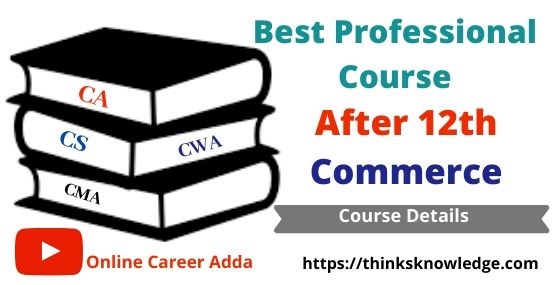After the result of the 12th, so many commerce students become confused that in which course they take admission. Earlier it was not so because the courses were also limited, only B.Com after that M. Com has to be done. But today’s situation has changed. Now I am going to discuss Best Professional Courses After 12th Commerce in which to become the best career in the future.
My Dear Students, I am going to tell you the top 4 professional courses in commerce, in which you can improve your career after 12th in the commerce field.

Table of Content
Professional Courses After 12th Commerce
- CA (Chartered Accountant)
- CS (Company Secretary)
- CWA (Cost and Work Accountant)
- CMA (Cost Management Accounting)
1. CHARTERED ACCOUNTANT (CA)
Due to the long duration of the CA course, the right time to start CA is only after passing 12th. For preparing for CA, students should first get a good knowledge of accounting, Law, and Economics. Chartered Accountant is a professional course after 12th commerce.
Steps to Become a CA in India
The syllabus of Chartered Accountant is divided into 4 steps
- CA Foundation
- CA Intermediate
- Article ship Training (3 years)
- CA Final
Now I m going to the discussion in detail all 4 steps to becoming a CA:
1. CA Foundation Course
After pass 12th you will give the exam for C. A Foundation Course, then you will have to give only 4 papers in this foundation examination. All these papers are given for 3 hours. All these papers are of 100 numbers to pass it is necessary to bring at least 40% marks in all these papers and 50% marks in all papers.
| Sl. No. | Paper | Subject | Marks |
| 1 | Paper 1 | Principal and Practices of Accounting | 100 Marks |
| 2 | Paper 2 (A) | Business Mathematics | 60 Marks |
| 3 | Paper 2 (B) | Statistics | 40 Marks |
| 4 | Paper 3 (A) | Mercantile Law | 60 Marks |
| 5 | Paper 3 (B) | General English | 40 Marks |
| 6 | Paper 4 | Business Economics | 60 Marks |
| 7 | Paper 4 (B) | Business and Commercial Knowledge | 40 Marks |
2. CA Intermediate
After you pass the CA Foundation, you are a different step of the CA Intermediate Course. Under the foundation route, you can register yourself for intermediate after passing the CA Foundation. The curriculum at CA Intermediate is very comprehensive and this makes this level more challenging.
Generally, students are not on the level for clear CA Intermediate exams in the first attempt, but if you plan your studies and revise correctly as well as strategically, you will not only clear this level rather you will also be able to achieve rank if you dream like that.
ICAI has introduced some changes in the examination pattern of CA examinations to be held in 2019 attempt and onwards: Now the following papers of CA Intermediate shall have Multiple Choice Question (MCQ’s)
CA Intermediate New Course
| SI. No. | Paper | Subject |
| 1 | 2 | Corporate and other Laws |
| 2 | 4 | Taxation |
| 3 | 6 | Auditing and Assurance |
| 4 | 7 | Enterprise and Information Systems and strategic management |
CA Intermediate (IPC)
| SI. No. | Paper | Subject |
| 1 | 2 | Business Laws, Ethics and communication |
| 2 | 4 | Taxation |
| 3 | 6 | Auditing and Assurance |
| 4 | 7 | Information Technology and strategic management |
The question papers of the respective papers will have two parts, part 1st comprising MCQ’s (30 marks) and Part 2 containing the descriptive type question questions (70 marks).
Eligibility for registration in CA Intermediate Course
After approving the CPT / CA Foundation, a student will be eligible for registration for CA Intermediate. There is also a direct entry route through which a candidate can enroll for intermediate without going through either CPT or CA Foundation directly.
Students who are Graduate / Post Graduates in Commerce and have achieved a minimum of 55% can directly register for Intermediate without passing CA Foundation or CPT. Similarly Commerce Graduates, Non-Commerce Graduates / Post Graduates can also register for Intermediate by securing 60% marks in Graduation / Post Graduation.
The above mention qualification students can get register directly go for the Intermediate level without passing the entrance level.
3. CA Article ship Training (3 years)
Candidates can start their article ship training as soon as they pass any group of CA Intermediate. But before that, you have to go through ITT and OT programs. This Article ship training program is completed after 3 years successfully completed.
Candidates who have appeared simultaneously in both groups of CA Intermediate should attempt to complete 100 hours of IT training during this waiting period. This will save you time after the CA intermediate result is declared. After completing IT, if possible, also complete your OT program.
Candidates who have appeared in the same group should start preparing for the next group. If you plan articles and the next group with the office then it will be a really difficult task, and it can take many efforts from your other group. Therefore, you should complete your CA Intermediate first and then go with article ship training.
4. CA Final
On the fourth step of the CA Final Exam Pattern 2020, The Institute of Chartered Accountants of India (ICAI) announces the exam pattern for the CA Final 2020 as well as repeated revisions. Earlier, ICAI had introduced a change in the CA Final Exam Pattern 2020 for elective exams, i.e. some questions from papers 6A to 6F and have been identified under case study.
Candidates desirous of appearing for the upcoming May 2020 session of the examinations to be held from May 2 to May 17 should first take a look at the CA Final 2020 exam pattern and prepare for the exam. The CA final test pattern provides for the mode in which the exam is to be conducted, ie online or offline.
It also shows the maximum marks, medium-type of questions, marking scheme, etc. conducted by a section and the overall paper. There are two groups of ICAI CA finalists, with 8 subjects distributed, requiring candidates to pass at least 40% sectional (in the individual paper) and 50% overall CA Final 2020.
2. COMPANY SECRETARY (CS)
Company Secretary (CS) is one of the key positions in a company. He/she acts as the conscience seeker of the company. A certified company secretary professional is hired to handle and solve the legal aspects of a company or firm. A CS is responsible for the tax returns of the entire company, keeps records, advises the board of directors, and ensures that the company complies with legal and statutory regulations. In both private & public sector firms are known to appoint company secretaries. CS has a huge role in ensuring the smooth functioning of the company. CS is a professional courses after 12th commerce.
The Institute of Company Secretaries of India (ICSI) is the only recognized professional institutional body in India for the development and regulatory body for the profession of CS.
The Institute of Company Secretary of India provides training to candidates wishing to pursue CS. The institute conducts its CS programs at three levels. On completion of the course, certificates are issued to the candidates.
The programs launched by ICSI at Three (3) levels:
- Foundation program
- Executive program
- Business program
Eligibility Criteria for Company Secretary (CS)
The foundation program may be pursued by 10 + 2 pass or equivalent students of Arts, Science or Commerce stream (except Fine Arts). The executive program may be followed by graduates from all streams except the fine arts. The professional program can be pursued only after clearing the executive program of the CS course.
Therefore, if you are a 10 + 2 passed student, you should start with the foundation program and follow it with executive and professional programs. If you are a graduate degree holder, you can choose to pursue the executive program and opt for it with a professional program.
Subject Skill for Company Secretary (Foundation)
| SI. No. | Subject |
| 1 | Business Environment |
| 2 | Entrepreneurship |
| 3 | Management |
| 4 | Communication |
| 5 | Ethics |
| 6 | Economics |
| 7 | Accounting |
Subject Skill for Company Secretary (Executive)
| SI. No. | Subject |
| 1 | Company Law |
| 2 | Commercial Law |
| 3 | Tax Law |
| 4 | General Law |
| 5 | Securities Law |
| 6 | Accounts & Audit Practice |
3. COST AND WORK ACCOUNTANT (CWA)
Cost Accountancy is a course similar to CA. The Institute of Cost and Works Accountant of India offers a course in cost accountancy. Even after 12th, students can take the ICWA course. For this, the first 12th pass students have to take a foundation course. After completing the course, students get a chance to work in Cost Accountants and related positions. CWA professional courses after 12th commerce.
For this, an application has to be made to The Institute of Cost and Work Accountants of India. The entrance examination takes place in June and December for admission. After the foundation course, an intermediate course is to be done and then the course is completed by giving a final exam like CA.
4. COST MANAGEMENT ACCOUNTING (CMA)
These days, the CMA course becomes popular among commerce students, who want to pursue as a professional career in the area of Cost and Management accounting. CMA professionals have become experts in professional ethics, budgeting and forecasting, financial planning, and its control. CMA is a professional courses after 12th commerce.
Nowadays, students become more curious about the CMA course subjects, CMA course syllabus, CMA exam, and how they make a career after completed Cast Management in Accounting. There is no difference between CMA and ICWAI both are the same.
There are 3 stages in the ICWA course of CMA;
- CMA Foundation
- CMA Intermediate
- CMA Final
My dear students, if you want to become a Cost Management Accountant. First, you have to complete these three steps of the CMA course. Students who pass 10 + 2 are eligible for the CMA Foundation Examination. The Institute of Cost Accountants of India conducts the CMA Foundation Examination twice a year in the months of June and December.
If you have passed the CMA Foundation Examination, you are eligible for the CMA Inter. If you have a bachelor’s degree, you are exempted from the ICMAI Foundation Examination. You can enter CMA Inter directly.
Eligibility Criteria for CMA Foundation Level
- Students should have passed Class 10 or equivalent from a recognized Board or Institution.
- Students have passed Senior Secondary Examination under 10+2 scheme of a recognized Board or Institution.
Eligibility criteria for CMA Intermediate Level
- A candidate should have passed 10+2 and Foundation Course of the Institute of Cost Accountants of India.
- Graduation in any discipline other than Fine Arts.
- Foundation (Entry Level) Part I Examination of CAT of the Institute.
- Foundation (Entry Level) Part I Examination and Competency Level Part II Examination of CAT of the Institute.
- Passed Foundation of ICSI/Intermediate of ICAI by what ever name called along with 10+2
Eligibility criteria for CMA Final
- A candidate should have passed Senior Secondary School Examination (10+2) and Foundation Course of the Institute of Cost Accountants of India.
- Graduation in any discipline other than Fine Arts.
- Foundation (Entry Level) Part I Examination of CAT of the Institute.
- Foundation (Entry Level) Part I Examination and Competency Level Part II Examination of CAT of the Institute.
- Passed Foundation of ICSI/Intermediate of ICAI by what ever name called along with 10+2
CMA Course Subjects (Foundation, Inter & Final Level)
| SI. No. | Paper | Subject |
| 1 | Paper 1 | Fundamentals of Economics and Management |
| 2 | Paper 2 | Fundamentals of Accounting |
| 3 | Paper 3 | Fundamentals of Laws and Ethics |
| 4 | Paper 4 | Fundamentals of Business Mathematics & Statistics |
| Inter Level | Inter Level | |
| 5 | Paper 5 | Financial Accounting |
| 6 | Paper 6 | Laws, Ethics and Governance |
| 7 | Paper 7 | Direct Taxation |
| 8 | Paper 8 | Cost accounting and financial management |
| 9 | Paper 9 | Operation Management Information System |
| 10 | Paper 10 | Cost and Management Accounting |
| 11 | Paper 11 | Indirect Taxation |
| 12 | Paper 12 | Company Accounts & Audit |
| Final Level | Final Level | |
| 13 | Paper 13 | Corporate Laws and Compliance |
| 14 | Paper 14 | Advanced Financial Management |
| 15 | Paper 15 | Business Strategy & Strategic Cost Management |
| 16 | Paper 16 | Tax Management and Practice |
| 17 | Paper 17 | Strategic Performance Management |
| 18 | Paper 18 | Corporate Financial Reporting |
| 19 | Paper 19 | Cost and Management Audit |
| 20 | Paper 20 | Financial Analysis & Business Valuation |
FAQs Courses After 12th Commerce
Best courses after 12th commerce with high salary
- Chartered Accountant
- Company Secretary
- Cost and Work Accountant
- Cost Management Accounting
Which is the best course after 12th commerce?
• B.com (Bachelor of Commerce)
• CA (Chartered Accountancy)
• CFA (Chartered Financial Analyst Program)
• CS (Company Secretary Program)
• CMA (Cost Management Accounting)
• BMS (Bachelor of Management Studies)
• BBS (Bachelor of Business Studies)
• BBM/A (Bachelor in Business Management/Administration)
• BBA (Bachelor in Business Administration)





